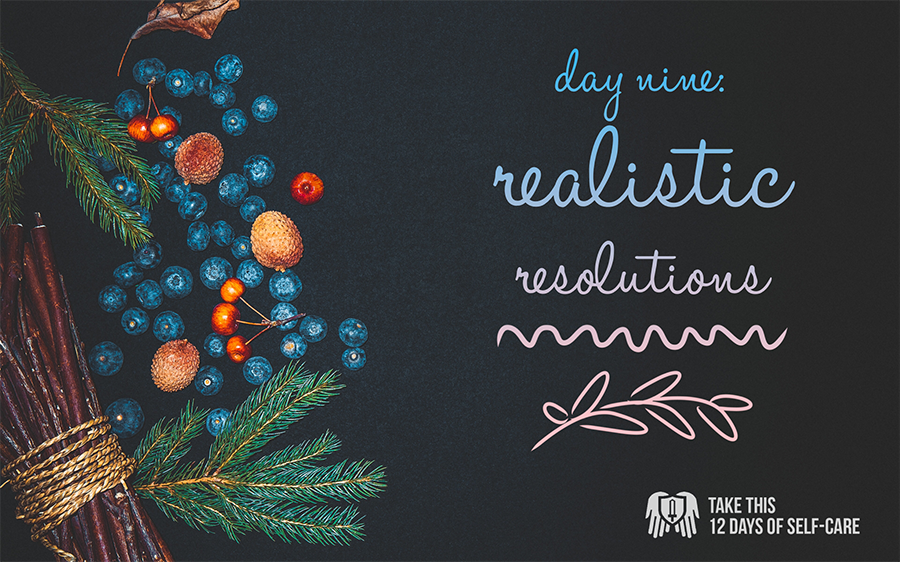
On the ninth day of our 12 Days of Self-Care series, Jen Loglia shares the secrets of achievable resolutions for the new year — or any other day. For more helpful tips on coping with common stresses of the holiday season and the transition into the new year, check back every day.
How many of us have made a New Year’s resolution that has sounded like, “I’m going to eat healthier this year!” or “I’m going to work out more!”? How did that work out for you? For me, I might’ve made it through January without eating some office donuts, then broke down in February for that discount Valentine’s Day chocolate. There starts my vicious cycle. “Welp, I failed my New Year’s resolution, let’s down my sorrows in some ice cream!” Not the way I wanted my resolution to go. What are some ways I can make better goals for myself (strategy), and can I change the way I think about my goals (mentality)? Let’s be real with resolutions.
How to make better goals
Let’s talk about the statement, “I’m going to eat healthier this year!” What’s wrong with that? It sounds like a great resolution, and it sounds like there’s some real benefit to accomplishing it. But what does it really mean? What does “eating healthier” look like? In my example above, “eating healthier” translated to “not eating anything that is perceived as bad.” Wow. That resolution is mighty lofty. It’s no surprise that it’s difficult to keep up! There are two strategies here that will resolve this issue: specificity and achievability.
Specificity: Be specific! Outline goals that are measureable, so you know if you’re achieving your goals and how you’re moving along. Examples of specific goals are: “I will eat one serving of vegetables every day” and “I will only eat up to one fast food meal per month.” This way, you know what to do, how often, and when. It’s way easier to track your progress.
Achievability: No one expects a level 1 rookie to defeat a level 20 boss. Just like a good video game, your goals should be challenging, but achievable. If you’ve never worked out before, start small: “Do 10 pushups 3 times a week” or “Walk for 30 minutes 3 times a week.” Allowing goals to be achievable now helps to build your foundation to achieve even bigger goals in the future.
Specificity and achievability work hand-in-hand: being specific allows you to determine whether or not you are actually achieving your goals and being achievable will outline the specific steps you need to take to make your goal a reality.
How to think about your goals
Again, going back to our example, once I thought I failed my goal, I just gave up. Hopefully, making your goals specific and achievable will, in and of itself, make keeping your resolution easier and your motivation high. But, it doesn’t always work out that way. So you only went on one walk this week instead of three. It’s okay! You can try again next week. It’s like that classic quote: “If you fall off the horse, you get back on.” Just because you don’t make one goal doesn’t mean you can’t make the next. Each goal helps you achieve your resolution. Finding that combination of making your goals achievable enough to realistically accomplish them and being able to forgive yourself when things don’t work out and carry on will lead you to success.
Another way to stay motivated is to think about why you chose your resolution in the first place. Why do you want to eat healthier? Maybe it’s because you want to feel better and more energized. You want to invest in future you. Think about future you; empathize with future you. How happy will future you be if you just chose the broccoli over the French fries? Super happy. Or, maybe your resolution helps out others. You want to volunteer more. Think about the impact your volunteering has for your cause; you can be the reason a pet finds a home or the reason a person gets off the streets. When looking at the outcome, always think big picture.
Lastly, remember to celebrate your success along the way. You’re doing it! Every win, no matter how small, is a win. And remember: you can make goals and resolutions any time of year.
Jen Loglia received her master’s degree in Industrial/Organizational Psychology from UCF. She currently works as a data analyst at JetBlue. Her heart lies with the gaming industry and the culture that surrounds it. Her New Year’s resolution is to sew one shirt (and maybe finish one game of Stardew Valley).
This article is not a substitute for medical advice or professional counseling. While we at Take This want to provide you with resources, we do not recommend or endorse any particular site, treatment, therapy, or resource. We provide these links at our sole discretion but have not necessarily vetted or reviewed any particular resource. We assume no liability for the use of the information or resources on these sites and encourage you to use your own best judgment when reviewing these resources.
If you live in the US and you’re having suicidal thoughts, reach out to the Suicide & Crisis Lifeline or call/text 988. If you’re outside the US, you can find local crisis lines at Suicide.org. If you’re even debating whether you should call them, you should call them. The Suicide & Crisis Lifeline handles all psychological crises, not just suicide.
